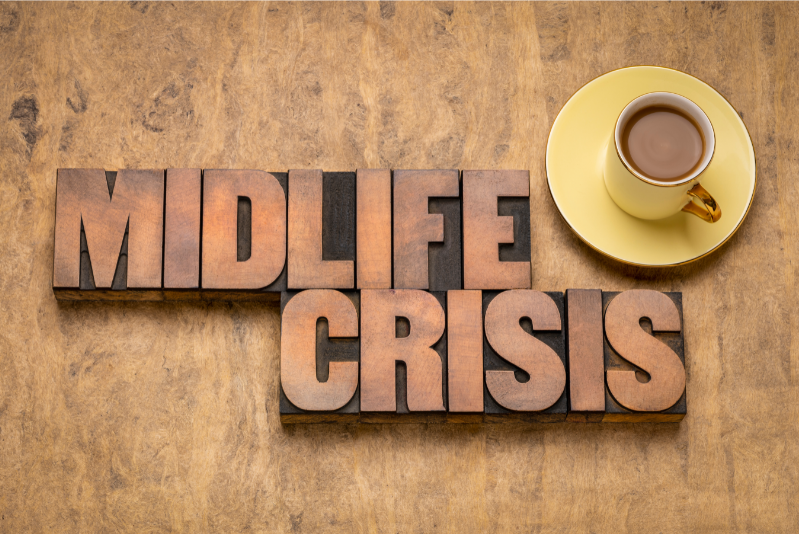Understanding the Midlife Crisis
A midlife crisis is a multifaceted experience typically occurring between the ages of 40 and 60, characterized by a profound period of self-reflection. It often involves evaluating past accomplishments, current life status, and future prospects. While societal stereotypes often portray midlife crises with drastic change, such as impulsive purchases or altering relationships, the phenomenon is deeply rooted in personal introspection and emotional upheaval. Understanding this phase requires acknowledging its broad spectrum of experiences.
Societal Perceptions and Stereotypes
Society often simplifies the midlife crisis into clichés, which fail to capture its complexity. Common misconceptions include impulsivity, such as purchasing extravagant items or making radical life changes. However, these stereotypes ignore the introspective nature and emotional depth of the experience, overshadowing its true essence.
The Emotional Landscape of Midlife
Identifying the Triggers
The onset of a midlife crisis can be attributed to various life circumstances, with career stagnation, shifting family dynamics, and reflections on personal accomplishments being prominent triggers. These elements often ignite feelings of dissatisfaction, urging individuals to reassess their life’s direction and priorities.
Emotional Turmoil and Its Impacts
The emotional struggles during midlife manifest as anxiety, depression, or dissatisfaction, impacting both mental and physical health. Recognizing these feelings as part of a natural emotional process is crucial to managing them effectively, preventing long-term negative effects on overall well-being.
Embracing Positivity During Midlife
The Power of Positive Thinking
Practicing positive thinking can transform one’s midlife experience by fostering resilience and optimism. Reframing thoughts through cognitive restructuring—identifying and replacing negative thought patterns—promotes an improved mood and heightened life satisfaction.
Mindfulness and Meditation Practices
Incorporating mindfulness and meditation into daily routines aids in stress and anxiety reduction. Techniques like deep breathing, mindful walking, or guided meditation help individuals stay grounded, nurturing a sense of calmness and mental clarity amidst emotional upheavals.
Cultivating New Opportunities
Career Changes and Skill Development
Midlife presents an ideal opportunity for exploring new career avenues or acquiring new skills. Engaging in continuing education, whether through online courses or workshops, can invigorate one’s professional life and inspire personal development.
Engaging in Creative Pursuits
Creative outlets, such as painting, writing, or playing music, provide a therapeutic means of expression and stress relief. Engaging in these activities not only nurtures creativity but also offers a productive escape from daily pressures and challenges.
Strengthening Relationships
Enhancing Family Bonds
Maintaining strong family ties during midlife involves open communication and shared activities. Consistent family gatherings and simple gestures of appreciation enhance bonds, creating a supportive and nurturing familial environment.
Building Community Connections
Developing social support networks outside the family is crucial for emotional well-being. Participating in community groups or volunteering fosters a sense of belonging, enriching social interactions and offering vital emotional support.
Promoting Physical Well-being
Importance of Physical Activity
Incorporating regular physical activity into daily routines is essential for health maintenance. Activities like walking, yoga, or swimming boost mood, energy levels, and overall physical well-being, contributing to a healthier lifestyle during midlife.
Nutrition and Self-care Practices
Pursuing a balanced diet and self-care routines is imperative for sustaining mental and physical resilience during midlife. Prioritizing nutritious meals and ensuring adequate rest help mitigate stress and promote overall health.
Strategizing for the Future
Financial Planning and Security
Financial planning is a common concern during midlife. Developing a comprehensive financial plan with clear goals for retirement and future expenses alleviates anxiety, ensuring peace of mind and security in later stages of life.
Setting Personal Goals
Setting achievable personal goals offers direction and fulfillment. Whether it’s learning a new skill, traveling, or engaging in community projects, such pursuits foster engagement, contributing to a sense of purpose and satisfaction.
Finding Balance Amidst the Chaos
Amid the complexities of a midlife crisis, embracing positivity and taking intentional steps forward can transform the experience into one of growth and discovery. By focusing on emotional, physical, and social well-being, individuals can cultivate a balanced and purposeful life.
How We Can Help
At UnifiedCaring.org, our mission is to support you on your journey during this transformative phase. By joining our community, you gain access to an array of valuable resources, including 24-hour counseling hotlines, daily positive news feeds, discounted fitness memberships, online meal planners, and more. Our services for seniors include cognitive screenings and a free friendship and crisis support line. Join the Unified Caring community today. Learn more about our membership benefits here.

